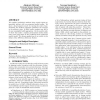Free Online Productivity Tools
i2Speak
i2Symbol
i2OCR
iTex2Img
iWeb2Print
iWeb2Shot
i2Type
iPdf2Split
iPdf2Merge
i2Bopomofo
i2Arabic
i2Style
i2Image
i2PDF
iLatex2Rtf
Sci2ools
105
click to vote
ATAL
2010
Springer
2010
Springer
When do markets with simple agents fail?
We consider (prediction) markets where myopic agents sequentially interact with an automated market maker. We show a broad negative result: by varying the order of participation, the market's aggregate prediction can converge to an arbitrary value. In other words, markets may fail to do any meaningful belief aggregation. On the positive side, we show that under a random participation model, steady state prices equal those of the traditional static prediction market model. We discuss applications of our results to the failure of the 1996 Iowa Electronic Market. Categories and Subject Descriptors J.4 [Social and Behavioral Sciences]: Economics General Terms Economics, Experimentation, Theory Keywords Prediction Markets, Market Equilibrium, Price Theory, Market Failure, Zero Intelligence
Related Content
| Added | 08 Nov 2010 |
| Updated | 08 Nov 2010 |
| Type | Conference |
| Year | 2010 |
| Where | ATAL |
| Authors | Abraham Othman, Tuomas Sandholm |
Comments (0)

